January 27, 2023
Air Date: January 27, 2023
FULL SHOW
SEGMENTS
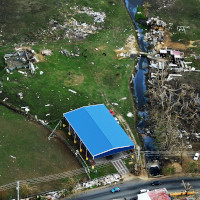
Big Oil Under Fire in Puerto Rico
View the page for this story
Sixteen municipalities in Puerto Rico sue big fossil fuel companies for damages from Hurricanes Irma and Maria. The communities allege the fossil fuel companies learned their products would change the climate and intensify storms and then colluded to lie about it to the public. A win for the plaintiffs would be historic. LOE's Steve Curwood spoke with Melissa Sims, Senior Counsel with the Plaintiff's law firm Milberg. (19:07)
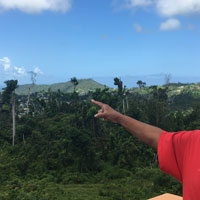
Rebuilding With Resilience in Puerto Rico
View the page for this story
Human-induced climate change has supercharged massive storms like Hurricane Maria in 2017 that devastated Puerto Rico, killing thousands of people. Living on Earth’s Bobby Bascomb travelled to the island in 2018 and found ravaged communities organizing to rebuild with resilience. (18:49)
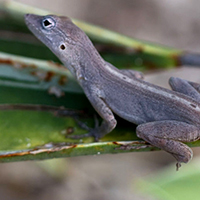
Science Note: Hurricanes, Lizards, and Leafblowers
/ Don LymanView the page for this story
Hurricanes may act as a force of natural selection for Caribbean lizards, according to a study in the journal Nature. Living on Earth’s Don Lyman explains how scientists used leaf blowers to simulate hurricane-force winds and learn how the hardiest lizards hang on. (02:09)
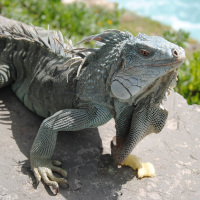
Beyond the Headlines With Peter Dykstra
/ Peter DykstraView the page for this story
Journalist Peter Dykstra joins host Steve Curwood to discuss why fewer iguanas are falling in Florida during cold snaps. They also consider if England's recent ban on some single-use plastics set to take effect in October will stem the accumulation of disposable plastic. For a history lesson, they dive into Karl Benz's 1886 patent for a three-wheeled, chain-driven, gasoline-powered horseless carriage he obtained with financial and design help from his wife Bertha. (04:48)
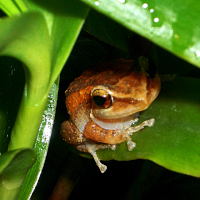
Listening on Earth: Coquí Chirps
View the page for this story
Coquí frogs were heavily affected by Hurricane Maria, but within months of the storm, they could once again be heard making their iconic calls across the island. Living on Earth's Bobby Bascomb recorded these coquí noises in the mountains of Puerto Rico. (00:52)
Show Credits and Funders
Show Transcript
230127 Transcript
HOSTS: Steve Curwood
GUESTS: Melissa Sims
REPORTERS: Bobby Bascomb, Peter Dykstra, Don Lyman
[THEME]
CURWOOD: From PRX – this is Living On Earth.
[THEME]
CURWOOD: I’m Steve Curwood
Municipalities in Puerto Rico sue the biggest fossil fuel companies alleging their products worsened hurricanes and they colluded to lie about climate change.
SIMS: The complaint asks for damages. And that's what a court is designed to do. A court is designed to reimburse a party for their loss. And that's what we intend to do we intend to reimburse the municipalities of Puerto Rico for their loss for the 2017 Atlantic hurricane season.
CURWOOD: Also, hurricane Maria felt like the end of the world for some Puerto Ricans who lived through it.
NIEVES: It was like all the movies that you’ve seen of Armageddon, of destruction, of the end of days, it was like - this is done. And the fact that the communication collapsed meant that also we couldn’t hear the government, but we couldn’t hear each other. All we had was the people next to us.
CURWOOD: That and more this week on Living on Earth – Stick Around!
[NEWSBREAK MUSIC: Boards Of Canada “Zoetrope” from “In A Beautiful Place Out In The Country” (Warp Records 2000)]
[THEME]
Big Oil Under Fire in Puerto Rico
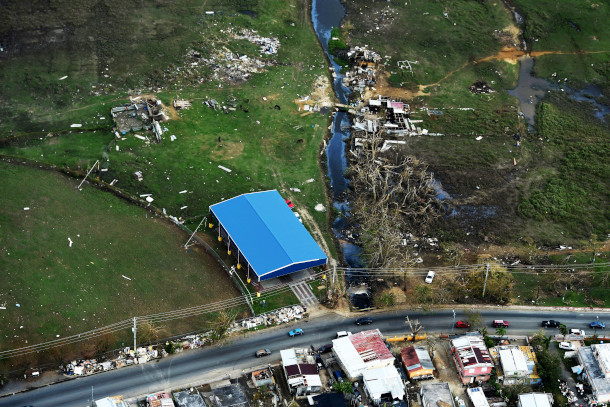
Hurricanes Irma and Maria caused billions of dollars in damage to Puerto Rico. Puerto Rico's government estimated it would need $132 billion from 2018 through 2028 to repair and replace the infrastructure damaged by the hurricanes. (Photo: US Department of Agriculture, Flickr, Public Domain)
CURWOOD: From PRX and the Jennifer and Ted Stanley Studios at the University of Massachusetts Boston, this is Living on Earth. I’m Steve Curwood.
When the Category Five Hurricanes Maria and Irma smashed through Puerto Rico in 2017, they left in their wake some one hundred billion dollars in damages and thousands of people dead. Today a group of small cities and towns in Puerto Rico are suing the biggest fossil fuel companies for damages, alleging climate change linked to the burning of the fossil fuels they sold supercharged those hurricanes. The plaintiffs allege the fossil fuel companies knew for decades that their products would change the climate but colluded together in a disinformation campaign to deny that fact as they kept selling oil, coal, and plastic to a deceived public. The class action complaint claims that the companies including Exxon, Chevron and Shell engaged in consumer fraud, anti-trust violations and racketeering in civil violation of the Racketeer Influenced And Corrupt Organizations statutes known as RICO. It’s a civil action as only prosecutors can bring criminal RICO charges. This case is called Municipality of Bayamón et. al versus Exxon Mobil Corp. et. al and was filed in November in federal court in Puerto Rico. Other jurisdictions have sued fossil fuel companies over climate change, but the RICO, consumer fraud and anti-trust aspects of this action against multi-national oil majors are unusual and if successful would be historic. Joining us now is Melissa Sims, Senior counsel with the law firm Milberg, representing the plaintiff cities and towns. Welcome to Living on Earth Melissa!
SIMS: Hey, welcome. Thank you.
CURWOOD: So, let's talk about the various parts of this action. Your complaint says consumer fraud. What are you alleging there?
SIMS: So, as alleged in the complaint that the defendants, in order to sell their consumer products, withheld information from the public that they knew was untrue. They had particularized internal information dating back longer than I've been alive, I'm 54 years old, saying what we all know is now true. So Exxon had an intern in 1978, that predicted with particularity what is exactly happening in this world today, and his name was Steve Knisely. And during his summer internship, he put together a memo which is now being released. And it really is the original memo that base the 1980s documents from Exxon as to what we're going to do with this fossil fuel problem. They talked about how they had a greenhouse problem. And this intern in 1978-1979, put together a memo and a chart that is so eerily accurate of what is exactly happening in today's world. It has on one line of the axis the year, on one line the carbon in the atmosphere, and on the other line, how much the world was going to warm. And this intern in 1978, predicted what was going to happen today, tomorrow, in the future. Instead of taking that knowledge and doing the right thing. They used that knowledge and they concealed it. They colluded with one another in violation of federal racketeering laws. And they elected to embark on a deceptive campaign to change public opinion. And you can't do that, when you are selling a consumer product and you have internal information and then you pay for someone else to say something that you know, is untrue, that violates federal law. And when you do that you are embarking on a consumer deceptive campaign. And that's something that our law firm has done for years is sue companies for concealing information, propping up other experts and trying to say to the public something that they know is not true.
CURWOOD: Now why are you bringing this action with the allegations of racketeering? It sounds like you know, mob bosses in the mafia.
SIMS: So when you have a racketeering case all it needs to allege is that you have an enterprise and that enterprise consists of more than one person outside its own entity. So it could be two corporations, it could be two individuals, but it's someone outside itself, it's not a subsidiary, it's not someone who is an affiliate. It is two separate parties that get together to promote a scheme. And that scheme has to have at least two predicate offenses. And those predicate offenses are listed under the federal racketeering statute. And they include murder, robbery, all those, you know, things that you're talking about there, the mob boss type of allegations, but they also include wire fraud and mail fraud. And really this type of case plaintiffs do this, our firm does this quite frequently is file racketeering cases against several defendants who are coordinating with one another to perpetuate a fraud by using the internet or the mail. Anytime you send something over the internet, that is not true in perpetuation of that scheme, that is a predicate offense. So in order to make the claim for racketeering, you just need to show as a plaintiff that on more than one occasion, in the last 10 years that the defendants participated in a predicate offense in furtherance of the enterprise and that is what is alleged in the complaint.
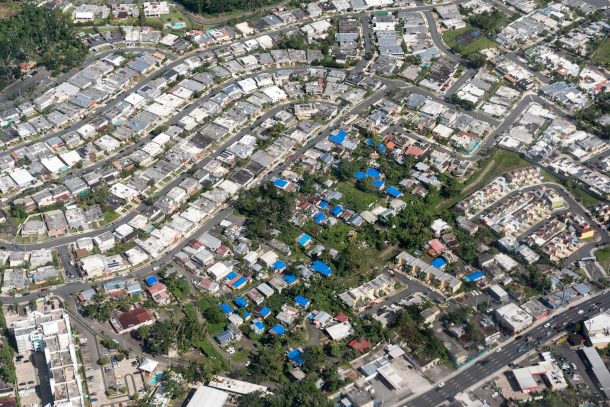
Blue tarps cover damaged roofs in San Juan, Puerto Rico seen from above after Hurricane Maria. Blue tarps provided by the U.S. Army Corps of Engineers provide a temporary covering of blue plastic sheeting to help reduce further damage to property until permanent repairs can be made. (Photo: Lorie Shaull, Flickr, CC BY 2.0)
CURWOOD: So talk to me about how Puerto Rico is vulnerable to climate change, or the evidence of Puerto Rico is so vulnerable to climate change, that you allege these companies promoted.
SIMS: So, generally speaking, without talking about strategy of the complaint, but generally speaking, Puerto Rico is the most affected by climate change in the world. I think it was, you know, had that dubious distinction a few years ago. And the reason why is not only is it precariously positioned as an eggshell plaintiff as alleged in our complaint, when hurricanes come through, they come through a very narrow band of the Atlantic Ocean. And that comes from the Sahara Desert, from the winds, that is, you know, scientific on how these hurricanes come to be. So, as they're making their way through the Caribbean, they are like spinning tops, there's 4,000 tropical storms, more than 4,000 tropical storms every year in the Atlantic Ocean. What makes one hurricane, what makes one fizzle out and die? We've all been to the Caribbean, we've seen storms come and go, you know, in a matter of 10 minutes, you just go up to your hotel room come back down, it's sunny again. But Puerto Rico is different, because it is precariously positioned right there in the hurricane center, in the hurricane zone, and the waters around Puerto Rico has warmed faster than any other water in the world. So when these spinning tops, when these tropical storms come through the Atlantic Ocean, and they bounce, if they come near that Puerto Rico warmer water, according to the scientist, Kerry Emanuel, who's quoted in our complaint, that is rocket fuel for a hurricane. So Puerto Rico doesn't have the luxury that we have in the mainland by sitting back and watching the guy wearing khakis on The Weather Channel talk about 'we're tracking this hurricane,' right? They don't have that luxury. They're at Ground Zero, they are at the frontlines of the hurricanes. And so they are living under constant state of fear as to when these monster hurricanes are going to come through, they don't have time to prepare. There is a disproportionate number of people in Puerto Rico who are handicapped, who are disabled, who do not have the means to leave and go somewhere else like we do in the mainland. But also with that monster hurricane fine comes the massive storm surge, and that's where the flooding comes in. In Puerto Rico, caskets rose and washed down rivers. So people of Puerto Rico had to watch caskets flowing down rivers. People were laying in their beds, and would drown because of the massive flash flooding. So Puerto Rico is not only just affected by that, but it's also affected by vectors, by mosquitoes, by Dengue fever, by Zika virus, and all of that as the climate gets warmer, and it has in Puerto Rico. As that climate gets warmer, the people of Puerto Rico are affected disproportionately than anyone else in the world.
CURWOOD: Why did the damages to Puerto Rico from Hurricane Irma and Maria fit within the provisions of the RICO statute?
SIMS: Well, the damages are directly related to their racketeering activities, as alleged in the complaint. So in order to prove a case, any case, not just this case, but any case, you have to show that the defendants conduct was a substantial factor in the plaintiffs damages. And of course, you can do a simple Google search. And you can read the scientific articles that we have alleged in our complaint to show that scientists now are showing that the rainfall itself related to the Hurricane Maria was five times to ten times more likely to be a cause because of climate change. The defendants are the major coal and fuel producers in the world. Actually, the Climate Accountability Institute actually did an analysis of the companies that are most responsible for climate change. The top 100 companies, and they have an actual percentage of each one and their contribution. So we know what each defendant has contributed towards climate change according to fossil fuels and the atmosphere. So these defendants as alleged in our complaint are 40.01% responsible for the carbon in the atmosphere, which directly affects Puerto Rico's damages.
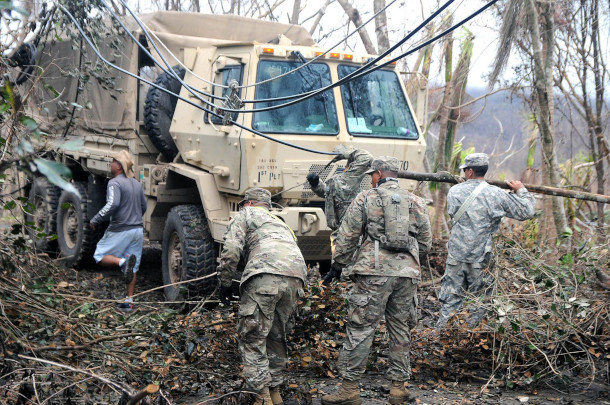
Citizen Soldiers of the 190th Engineer Battalion, 101st Troop Command, Puerto Rico Army National Guard, alongside residents of the municipality of Cayey, conduct a route clearing mission after the destruction left by Hurricane Maria through the region. Due to fallen trees, power lines and debris the several Puerto Rican communities were kept isolated for extended periods of time before clearing. (Photo: Sgt. Wilma Orozco Fanfan 113th MPAD, Puerto Rico Army National Guard, Flickr, CC BY 2.0)
CURWOOD: Now, scientists will say that any given storm may or may not be directly attributable to climate disruption, that you're looking at an overall trend, but a particular storm may or may not have been triggered by this. What's your response to that?
SIMS: The scientists in Puerto Rico have attributed the intensity of hurricane Maria to be caused by climate change. It's not the storm itself. It's the intensity. And the intensity has been directly related to climate change.
CURWOOD: Now you have done RICO cases involving consumer products in the past. Tell us a little bit about that.
SIMS: So our firm, Milberg, has been involved in numerous racketeering type conduct over the last 20 years. So recently with the opioid litigation, if you recall, where the opioid manufacturers and the distributors colluded together to flood the market with prescriptions, and so our firm was involved in that. And one of the allegations that was in the MDL was racketeering. There's been other numerous cases with our firm and with other of our sister firms that have filed. But there are also the omission cheat cases where some of the manufacturers auto manufacturers colluded with the manufacturers of the emission control devices, and decided to cheat the consumers into believing that their products met those standards. So our firm was also involved in that, but not just those cases, there has been a swell of racketeering cases over the last 15 or 20 years where plaintiffs have been successful getting past a motion to dismiss. And that's really the goal here is to get past a motion to dismiss to get into discovery and to find out more information that substantiates our claims because a lot of this information has been withheld from the public.
CURWOOD: Now, according to the complaint that you filed, this lawsuit, evidence of racketeering dates back to 1989 when the defendants formed the Global Climate Coalition. Tell me what is the Global Climate Coalition? And why are they included in this complaint?
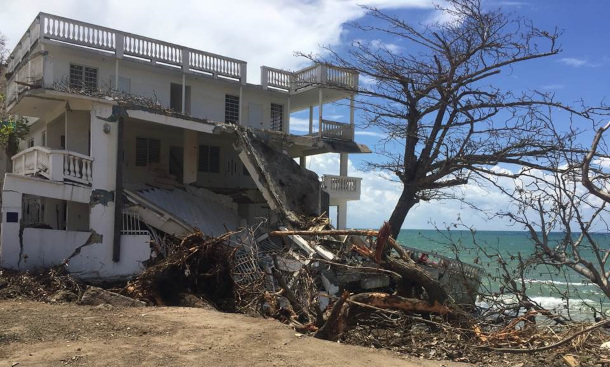
Home in Rincon Puerto Rico destroyed during hurricane Maria in 2017. (Photo: National Oceanic Atmospheric Administration, Wikimedia Commons, Fair Use)
SIMS: So generally speaking, just as alleged in the complaint without going deeper as more information that we're aware. But so what happened was the coal, not really the coal companies, but the oil companies had particularized internal documents, that they were fully aware that their products were causing a change to the atmosphere and would continue to do so. So in 1978, this intern, Steve Knisely has this memo that really sparked a lot of what happened in the 80s. So after Steve Knisely did this 1978-1979 memo, then other departments started extrapolating on that. And for a while it appeared that the oil companies were interested, you know, didn't really seem to take a position about what they were going to do about it. They were studying the problem, but they were fully aware of what was going to happen to our climate, that it was going to get hotter. The greenhouse effect has been, you know, coined since like the 1800s. So everyone kind of knew what greenhouse effect was. And so they were fully aware of that their products, the more we continued to use them in the atmosphere, that they would make the world warmer. So that was a really simple scientific concept. So, but then what happened was, they had to make the strategic decision whether they were going to invest in alternate energy, to tell the public what was going to happen if we continued to use those fossil fuel related products. But they chose the latter. And they chose to not tell the public what the truth was. And they colluded with one another. And they formed the Global Climate Coalition, which on its face, looks like a green company. You know, we call it greenwashing in the legal world, but it looks like it's for the environment, right? So really, what it was, was a very large group, thousands and thousands of members of companies that were fossil fuel dependent. And what they did is they worked together to promote their products. But at the core of it were the oil companies who were studying this issue. So in 1989, the Global Climate Coalition was formed. And it was really formed to stop the Kyoto Protocol, to stop anyone from regulating fossil fuel. And they were successful in doing that. Then they coordinated together in 1998 into a memo called the Victory memo. And in the Victory memo, that's really what it's called, the Victory memo. But they colluded with other parties who were actually part of the tobacco strategists. And they were charged with racketeering criminally and civilly by the Department of Justice. But so they colluded with the tobacco strategists to be like, how are we going to hide this information? And how are we going to change public opinion so that we could continue to sell our consumer products? And what's interesting about that is, in all the other racketeering cases that have been tried in the last 15-20 years, from a plaintiff, civil perspective, we haven't had anything in writing. And here we actually have a memo, we have a division of labor, among who was going to do what, what their goals were and how they were going to achieve them. So it appeared that the oil companies were studying, in earnest, a problem. They were actually fortifying their own equipment to ward against climate change, and at the same time telling the world that climate change wasn't real.
CURWOOD: So what are you asking for in this lawsuit?
SIMS: Well, the complaint asks for damages. And that's what a court is designed to do. A court is designed to reimburse a party for their loss. And that's what we intend to do, we intend to reimburse the municipalities of Puerto Rico for their loss for the 2017 Atlantic hurricane season, and Fiona.
CURWOOD: What about for consumers who purchased fossil fuels?
SIMS: Well, they should be reimbursed for their fraudulent purchases. That happens in all of our other consumer fraud cases, there's that if you purchase the product, and they, you know, deceptive, they were deceptive in telling you what the products were, and you know, their effects of it, then you as a consumer would be reimbursed.
CURWOOD: Based on your complaint, where you talk about the financial losses to the municipalities here, at least, how much money might we be talking about, if this action is successful?
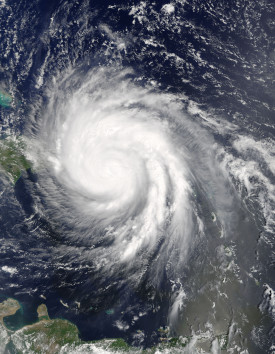
Deadly Hurricane Maria over Puerto Rico on September 20, 2017. (Photo: National Aeronautics and Space Administration, Wikimedia Commons, LANCE/EOSDIS, Public Domain)
SIMS: How much in terms of the losses to the municipalities? Oh, hundreds of millions of dollars and actual losses. I mean, their roads were washed away, their sidewalks were washed away. They spent overtime for all of their police officers, some of their police officers died. Some of their fire department equipment was lost. So the losses to these municipalities was astronomical, and they've really, you know, still not been able to replenish those losses.
CURWOOD: This kind of litigation as I understand it would, if you are successful, you could perhaps even get treble damages, three times the amount that was actually done.
SIMS: Yeah, for racketeering and antitrust, yes.
CURWOOD: So, let's say that you're able to demonstrate that these fossil fuel companies, in fact, conspired together to deny the dangers of climate disruption. What makes Puerto Rico special, here? I would say that people around the world, if that is true, have all been damaged by this behavior.
SIMS: Science. Science makes them better, because we have the science. The science has in the last few years, without a doubt. And we have a standard called 'Daubert', D-A-U-B-E-R-T, in federal court that we have to show and it is a consensus among scientists all over the world, that climate change has caused hurricanes to be bigger, hotter, wetter, stronger, faster, and Puerto Rico experienced that. And they experienced that to the point where, what 4000 people died? You know? So we have a duty, I believe, to show the world what happened in Puerto Rico. Not only what happened in Puerto Rico, but how Puerto Rico handled it, they are really a beacon for the rest of the world. I mean, we can turn to Puerto Rico and how they responded to Hurricane Maria. And I don't know if you've ever been to Puerto Rico, and I encourage everyone to go, they're the finest people on the face of the earth. But there were many communities without power for six months. Without power. These people were cleaning themselves with, in buckets. You know, they had no power to power their phones or have air conditioning, and they were washing their clothes in buckets. And yet they were still kind to each other. You know, and it really chokes me up thinking about the suffering that they had to deal with, but yet at the same time, they were helping each other out, and their story needs to be told.
CURWOOD: Melissa Simms is Senior Counsel at the law firm Milberg, thank you so much for taking the time with us today.
SIMS: And thank you.
CURWOOD: We reached out to each of the fossil fuel companies Melissa Sims mentioned in our interview. The only one that got back to us by our deadline was Shell. A spokesperson sent a statement that read in part “Addressing a challenge as big as climate change requires a truly collaborative society-wide approach. “We do not believe the courtroom is the right venue to address climate change, but that smart policy from government, supported by action from all business sectors, including ours, and from civil society, is the appropriate way to reach solutions and drive progress.” To read the full statement from Shell visit the Living on Earth website, LOE.org.
Related links:
- EPA | “What Climate change Means to Puerto Rico”
- Remezcla | “Report Finds Puerto Rico Is Affected by Climate Change More Than Anywhere Else in the World”
- Read the plaintiff’s complaint of Municipalities of Bayamón et.al. vs. Exxon Mobil Corp. et.al
- Learn more about Plaintiff’s Attorney Melissa Sims
- Reuters | “Puerto Rican Towns Sue Big Oil Under RICO Alleging Collusion on Climate Denial”
- CleanTechnica | “Putting the RICO In Puerto Rico — Lawsuit Alleges Oil Companies Are Racketeers”
[MUSIC: Habib Koite, Bamada “Batoumambe” on Baro, Contre-Jour]
Rebuilding With Resilience in Puerto Rico
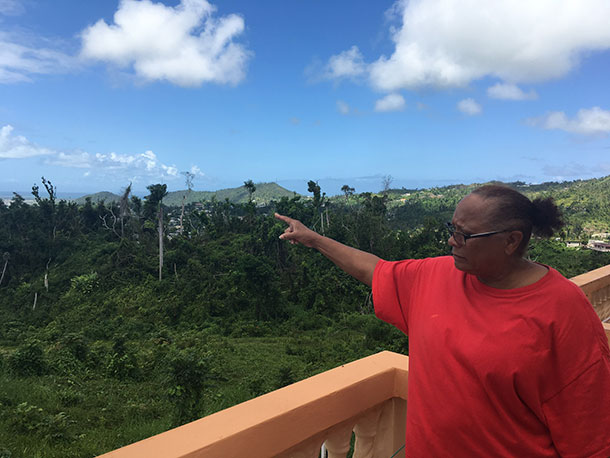
Gloria Vasquez points towards the broken and battered trees behind her house. (Photo: Bobby Bascomb)
CURWOOD: The impact of devastation from hurricanes Maria and Irma in 2017 can be measured in huge numbers, ranging from wind speed and inches of rain to property damages and lives lost. And to tell the human side of losses as well as resilience in the face of such catastrophe, we go into our archives now to present a story Living on Earth’s Bobby Bascomb brought back from Puerto Rico in the aftermath of Category Five Hurricane Maria.
[DRIVING SOUNDS GPS DIRECTIONS ‘IN HALF A MILE…’]
BASCOMB: To get to Humacao, Puerto Rico you can take highway 53, past McDonalds, grocery stores, and car dealerships. Except for the palm trees, it feels like you could be anywhere in the US. But turn up the narrow, twisty mountain road toward Humacao and it’s a different story. Electrical poles stick out of the ground at awkward angles. Electrical wires hang casually over the road, swaying in a light breeze.
NIEVES: There’s a lot of posts that look like they’re about to fall on people. Trees near highways that look like they are about to fall on cars. And that actually happened.
BASCOMB: Christine Nieves, she’s director of Proyecto Apoyo Mutuo, the Mutual Aid Project, based in a community center at the very top of the mountain in Humacao. Christina says downed power lines and unstable trees are now common here.
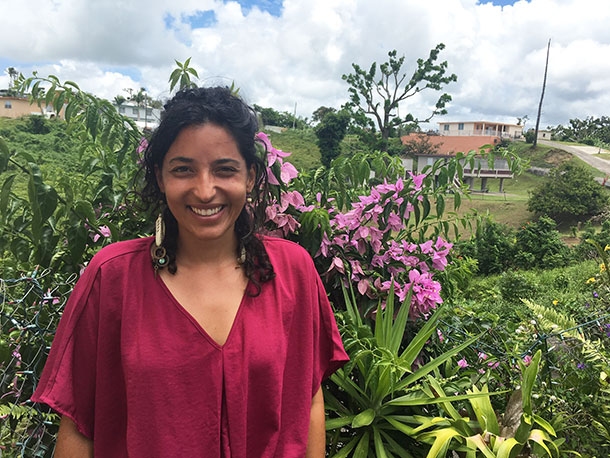
Christine Nieves is director of Proyecto Apoyo Mutuo, the Mutual Aid Project, founded after Hurricane Maria to help her community recover from the storm. (Photo: Bobby Bascomb)
NIEVES: There was a tragedy not too long ago of a young man dying from having a tree collapse on top of him. So you’re still seeing that.
BASCOMB: Christine is petit with wavy black hair and a bright smile. She wears a flowy pink top and long earrings. She left Puerto Rico to go to college at Penn State and then got her master’s degree at Oxford in England. She came back to Puerto Rico 6 months before Maria hit the island and settled here in Humacao, where the hurricane actually made landfall.
[WALKING SOUNDS]
Christine leads the way across a large parking lot to the edge of the mountain and points to a wide green valley below us.
NIEVES: So this is where the eye of the hurricane enters.
BASCOMB: Through this valley?
NIEVES: Yes. It actually made landfall first in this community and all of these mountains.
BASCOMB: Just to describe this area where we are. So right there is the ocean, so that’s obviously where the hurricane came in and just traveled up this little valley in between us here, between the mountain that we’re standing on and that mountain over there and hit these homes right in front of us.
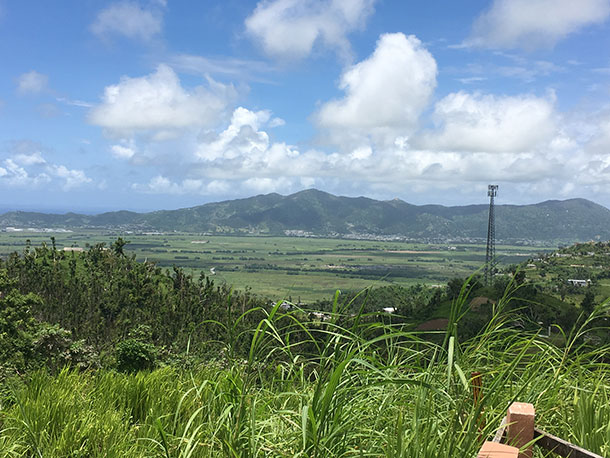
Hurricane Maria travelled up this wide green valley to the interior of Puerto Rico. (Photo: Bobby Bascomb)
NIEVES: Mmhm, absolutely.
BASCOMB: Were you here during the hurricane?
NIEVES: I was, yeah. My house is actually not too far from here.
BASCOMB: So what did it feel like?
NIEVES: It was chaotic. We prepared so well because we had basically a two-week heads-up. We were prepared from Irma already. We had storm shutters were up. We got water you know, a few days before the hurricane and we filled our cistern. But the actual hurricane, because we were so close we started feeling it on the 19th. One in the morning, we wake up - we start feeling, and hearing, the sounds, and it’s just loud and you can barely hear each other. And that’s when we started noticing that the water was coming in, through all the windows.
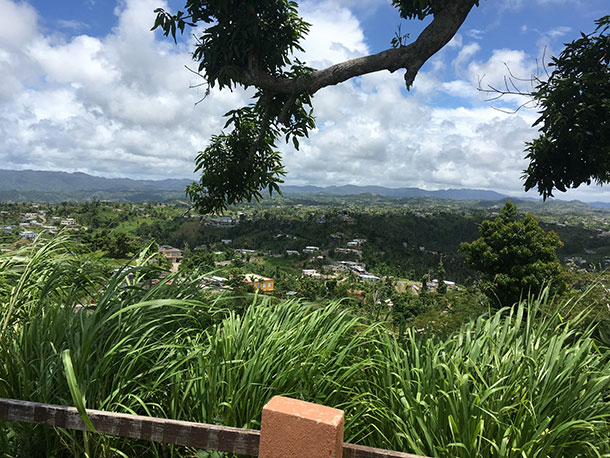
These homes in Humacao were some of the very first in Puerto Rico to feel the impacts of the Hurricane. (Photo: Bobby Bascomb)
BASCOMB: into your house?
NIEVES: yeah, through all the windows. Through the storm shutters, it didn’t matter. It was just coming through. And at first we were trying to figure out if we could dry the water and like address that. and then we also started noticing, we have all of our doors, glass sliding doors, and we noticed that the glass was bending inward, so to try to keep it from being pushed into the house, we took all of our furniture and backed it up to the wall, from the door to the wall, like in a chain. It was like, the table, and the chair, and the bookshelf - and everything supported each other all the way to the nearest column.
But that didn’t help. And it was around 4 in the morning that the, skylights exploded in, and then the windows exploded in as well. So there was glass flying. So at that point we actually got into the safest spot, which was a bathroom under the staircase. Other than the door, there was no other way of getting in or out. We got in. Dog, cat, three adults, in this tiny bathroom, and just waited. And then we started seeing the water coming in from under the door. It’s just like coming in, and coming in, so we’re like, what do we do? So we just put everything we had and basically everything that got wet we had to toss away.
And it was just, the hurricane came in. It was not just water, it was leaves. And then the painting from inside the walls was stripped… scraped off from the pressure. It was like a pressure washer had come into the house and just scraped… not only outside, but inside.
BASCOMB: The paint came right off your walls?
NIEVES: Mm hm.
BASCOMB: That sounds really scary.
NIEVES: Oh yeah. I mean, it was… Luis is a musician, so he was playing - my partner - he was playing the guitar. His cousin is also, you know, his entire family plays some sort of instrument, so he was playing the drums, or the percussion. So we were dealing with it by singing. And we spent the entire hurricane like that. And then once we actually got into the bathroom there was not a lot of space, so we kind of took a nap, sometime in the middle of the night, because you’re so exhausted, and there’s nothing you can do, you know, everything’s getting destroyed. And when we came out at 7 in the morning, we noticed that the, our 2,000 gallon cistern - something had come off, so the entire cistern was getting, was emptying out. And that was just at the moment when the wind was changing directions. So we never felt the calm of the storm, we were kind of… it was basically the wall of the eye, we never got the actual eye.
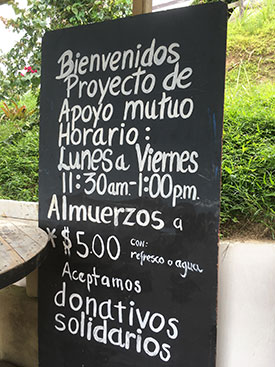
A sign advertises that the Mutual Aid Project accepts $5 “solidarity donations” for lunch Monday through Friday. (Photo: Bobby Bascomb)
So this was like, that wall of the eye just passed right through us. And we got, because of our altitude, we also got the strongest winds, and some of the storm shutters were actually pulled off of the wall. It was something so massive that you can’t quite understand it and comprehend it, when you see that something that’s designed to withstand storms didn’t, that’s when you realize, ok, we’re dealing with something that’s beyond the scales that we’re used to.
BASCOMB: So this forest right in front of us, I mean, you can see that it used to be a forest, and it still is to some degree, but there are no leaves really on the side of the trees and all of the tops are cut off at the same length, at the same height.
NIEVES: Yeah, so, all of these trees that you see here, they were massive. You couldn’t see beyond them. It was so thick, you couldn’t see the houses even. It looks much better eight months later, because nature is so wonderful and it can bounce back so much faster than human beings can in so many ways. But that was actually one of the first things I noticed, that even before FEMA arrived to the island, to Mariana, we were seeing the trees bouncing back. So the trees were faster in their response, than FEMA even.
BASCOMB: It looks like just a big chainsaw went through and just cut the tops off everything and stripped the sides off the trees.
NIEVES: Yeah. It was like a bomb exploded. And it was also… if you had come here the days after, it looked just like sticks, like matchsticks, just like sticking up, everything looked grey, and it was actually one of the hardest things, because people who live here, obviously, love nature, and it’s one of the reasons I moved back, and it was very hard to see the amount of destruction.
BASCOMB: When you came out here the day or two after the hurricane, how did it make you feel to see it look so different, to see the trees just denuded?
NIEVES: When we walked out of the bathroom and went to one of the windows in the house, we were on the bottom part of the house… oh my god, I - Luis, actually, my partner, started crying, because those were the trees that he grew up with. And it was just a complete feeling of… it was like all the movies that you’ve seen of Armageddon, of destruction, of the end of days, it was like - this is done. And the fact that the communication collapsed meant that also we couldn’t hear the government, but we couldn’t hear each other. All we had was the people next to us.
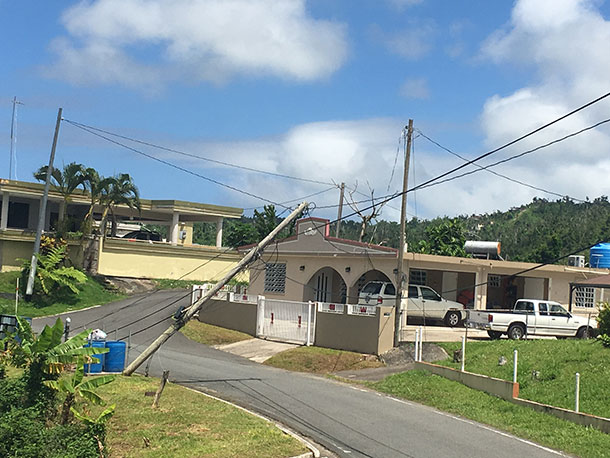
Eight months after the storm Puerto Ricans were still being injured and killed by falling trees and electrical poles. (Photo: Bobby Bascomb)
BASCOMB: In my 2.5 weeks reporting in Puerto Rico, I heard this same sentiment over and over again. Communities were isolated, FEMA and the government were slow to respond, so people turned to their neighbors for help. In many cases the dense forest before the hurricane had blocked their view of each other. People might not even know there was a house across the street or down the way a bit but after Maria turned the lush forest into match sticks neighbors could see each other for the first time and came to rely on one another for help.
NIEVES: The people in this area that are starting to understand that the government is not going to respond and save them, it’s actually going to be their neighbors, having, you know, the machetes ready. Knowing how to disinfect a wound. That’s one of the things that they saw the most, was wounds that could have been disinfected actually ended up in amputations. So they had to cut so many feet off because people were wearing flip-flops in standing water that had infections and they just couldn’t, they didn’t have something like iodine or something that could be easily over-the-counter, anyone can have, disinfecting the wound at the right time. So, it’s that kind of education and preparedness and it’s also community organizing to prepare for the next hurricane.
BASCOMB: Most of the residents of Humacao are older, retirees, who live alone and have been without electricity since the hurricane. Christina takes me to meet one of them.
NIEVES: So, let’s go find Gloria.
[CAR SOUNDS]
BASCOMB: I follow Christina down the mountain to meet Gloria Vasquez at her house a few miles away. A downed electrical wire grazes the top of a car parked in front of her house. She’s standing on her porch watering a potted pepper plant.
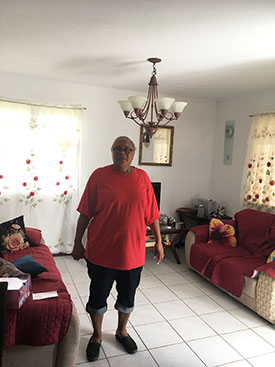
Gloria Vasquez standing in her living room. (Photo: Bobby Bascomb)
BASCOMB: Buenas!
VASQUEZ: Hello, buenas!
BASCOMB: Como estas?
VASQUEZ: Bien, bien.
VASQUEZ: Let me show her something I am planting.
BASCOMB: Of course
BASCOMB: Gloria is 70 years old, she wears an oversized red t-shirt and her hair slicked back in a small pony tail. Her house sits on the side of the mountain overlooking the valley. She can see clear to the ocean some 40 miles away. Before the hurricane Gloria says she could only see the dense forest in her yard and an avocado tree taller than her house.
VASQUEZ: The tree, it was so big, tall. It feel me very very bad. And I cry like crazy. Because I don’t think that Puerto Rico is going to be like that, you know.
BASCOMB: You didn’t think it could look like that.
VASQUEZ: No, no. No, I don’t think it’s going to be like that. And still I hurt. I feel, you know, about what happened to Puerto Rico.
BASCOMB: Gloria has accepted her lost trees and the broken landscape but she’s still struggling to deal with day-to-day life living alone without electricity.
GLORIA: It’s hard. Sometime I sit there and I cry because the light, I need the light, you know? I don’t have no fridge, to cool my stuff, because I got diabetes and I need to put my insulin in the fridge.
BASCOMB: So what do you do?
GLORIA: Sometime I take it the ladies in my neighborhood, Sandra, and then Sandra let me, give me a key to put them inside the refrigerator. She got a generator.
BASCOMB: So what do you do? How do you manage it at nighttime?
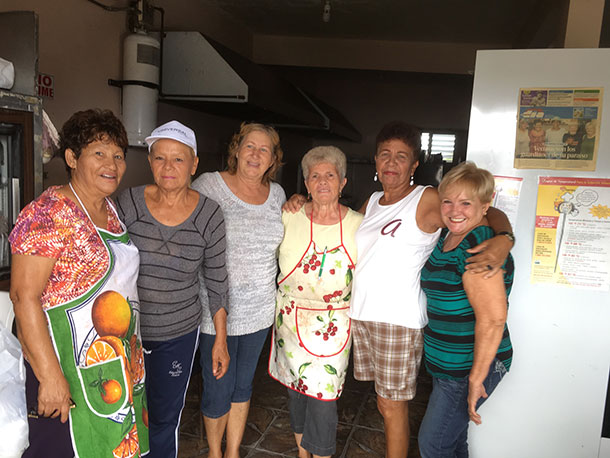
Each week a group of volunteers gathers to cook for the community. Feeding their neighbors is a type of therapy. The ladies get out of their lonely dark homes for the day and connect with friends. (Photo: Bobby Bascomb)
VASQUEZ: By 6:30 it’s starting getting darker so I lock the gate and I lock the door and I stay inside the house, because you don’t know, you know. There’s a lot of thief here.
BASCOMB: A lot of theft.
VASQUEZ: Yeah. They ask me, oh are you there by yourself - no, I’m not by myself. I got a husband. My husband is the police and he is working.
BASCOMB: Gloria lived most of her life in the Bronx. She moved there as a teenager with her family and worked for 50 years, mostly as a hair dresser. She saved her money all those years to retire in her native Puerto Rico where she bought this 3-bedroom cement house.
VASQUEZ: You want to come inside the house?
BASCOMB: Yeah.
[SFX - shuffling into house]
VASQUEZ: This is the living room over here. This is my dining room, and the kitchen. You see, it’s dark. Let me get the flashlight.
BASCOMB: Gloria shows me around her dark house. She pauses at a crèche and a statue of the virgin Mary given to her by her mother.
GLORIA: She gave me this one and this one here. They always here with me. Those are the ones that take care of me.
BASCOMB: She points out framed pictures of her grandchildren and her three sons.
GLORIA: That’s my baby boy here when he graduate.
BASCOMB: How old is he now?
VASQUEZ: He’s going to be 40. And that’s me when I graduate from beauty school. Midway Beauty School in New York.
BASCOMB: In her tidy kitchen Gloria has a few vegetables on the counter, a gas stove, a refrigerator empty but for a bottle of maple syrup, and a small red cooler on the floor where she keeps perishables like milk.
VASQUEZ: But I don’t buy no meat, because meat is getting worse quick.
BASCOMB: It goes bad quickly.
VASQUEZ: yeah
BASCOMB: What do you eat then?
VASQUEZ: If I want to eat something, I go into the store right there, I buy whatever I want to eat, and then I bring it. Today I’m gonna eat verdura.
BASCOMB: Vegetables
VASQUEZ: Yeah. This is my dinner for today.
BASCOMB: Eggplant and plantain
VASQUEZ: Eggplant, banana, and potato. That’s my dinner and my lunch, is going to be today. And this, hamonia.
BASCOMB: That’s like spam.
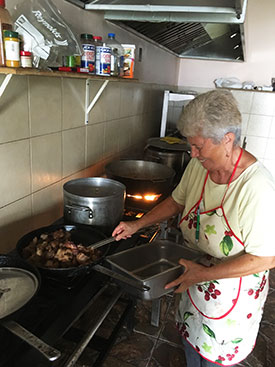
Maria cooks up chunks of pork for lunch at the community center in Humacao. (Photo: Bobby Bascomb)
VASQUEZ: Yeah, spam. And then I cook it and eat half, and I leave the other half for later. That’s the life here. Hard, hard. But what I gonna do?
BASCOMB: That’s the life for most of the residents in Humacao. The majority of people here are elderly, living alone, and without power. That isolation can be depressing and deadly. But since Maria hit locals are looking to each other for solace and sustenance.
[DRIVING SOUNDS]
The next day I drove the twisty road back to the mountain top community center in Humacao. Half a dozen older women have gathered today to cook for their neighbors, as they do each week, Monday through Friday.
There’s a sign out front that indicates when they’ll be cooking and says ‘aceptamos donativos solidarios’ we accept solidarity donations. For five dollars any one can buy a home-made lunch of rice, beans, and meat. Maybe some fruit if one of the ladies has extra papaya or pineapple coming up at home. Today a woman, ironically named Maria, is cooking up chunks of pork.
[SIZZLING SOUNDS]
MARIA: I like to make the meat soft and nice and tender. Would you like a bite?
BASCOMB: It’s very good.
MARIA: It is, it is. Rice and beans… oh gosh we’re eating good here.
BASCOMB: Maria says coming here to feed the community is a type of therapy for her. She gets out of her lonely dark house for the day and cooks with her friends. They chat about family and argue like sisters. Life feels normal again.
This theme of working together and resilience is everywhere in post- Maria Puerto Rico.
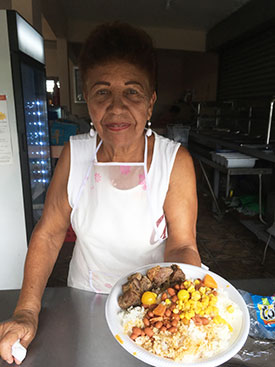
Lunch is served! For $5, anyone can buy a lunch of rice, beans, and meat. Beyond food, community members can connect with one another and feel less alone. (Photo: Bobby Bascomb)
About 9 months after the storm a local musician named Hurray for the Riff Raff produced a song in part about recovery on the island. The music video shows scenes of hurricane ravaged communities and tells the story of a young family trying to work through it.
[MUSIC: Hurray For The Riff Raff, “Pa'lante” on The Navigator]
Pa’lante is truncated from the Spanish phrase para adelante, which literally means move forward but Humacao community organizer, Christine Nieves says it means much more than that now.
NIEVES: So, ‘pa’lante’ means we’re going to keep moving forward, we’re going to keep rising, and we’re going to keep fighting. it’s about connecting with the root. we’ll look back at this moment in history and I think it’ll have a huge fork on the road in what it does to the Puerto Rican psyche. The conclusion at the end of this disaster that we’re still living in is that it’s us, we were the ones that could respond. We were the ones that were capable of saving lives, and it was community members that were capable of doing it. So, pa’lante. We keep building, we keep building.
[MUSIC: Hurray For The Riff Raff, “Pa'lante” on The Navigator]
BASCOMB: If there’s any silver lining to the devastation that Maria brought here it might be this: a renewed sense of community, Puerto Rican pride, and resiliency that people hope will keep them moving forward to rebuild and meet the next challenge together.
[MUSIC: Hurray For The Riff Raff, “Pa'lante” on The Navigator]
CURWOOD: Living on Earth’s Bobby Bascomb.
Related link:
Hurray for the Riff Raff
[MUSIC: Hurray For The Riff Raff, “Pa'lante” on The Navigator]
CURWOOD: Just ahead- our weekly trip Beyond the Headlines with Peter Dykstra but first this Note on Emerging Science from Don Lyman.
[SCIENCE NOTE THEME]
Science Note: Hurricanes, Lizards, and Leafblowers
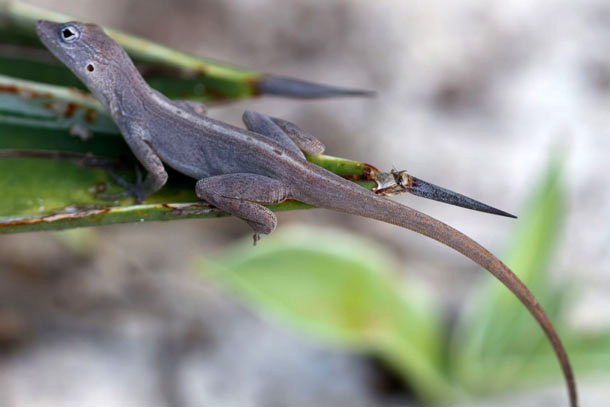
A female anolis scriptus lizard. (Photo: Rian Castillo, Wikimedia Commons CC BY 2.0)
LYMAN: A study published in the journal Nature, demonstrated that hurricanes might act as a force in natural selection for certain lizards. Scientists were already studying a species of anole, Anolis scriptus, a small lizard native to the Turks and Caicos, when Hurricane Irma hit their study area in 2017. The scientists returned to their research site after the storm, and observed that the surviving lizards had longer forelimbs, shorter hindlimbs and bigger toe pads on average, than the overall population of lizards present before the hurricane.
The researchers speculated that perhaps these body characteristics might have helped the remaining lizards survive the hurricane, meaning hurricanes could be a factor in natural selection, possibly affecting the evolutionary trajectory of the lizards. But the scientists also wanted to know how the lizards survived the hurricane to begin with. Did they hide on the ground, or in crevices in trees, or did they ride the storm out by clinging to branches and tree trunks?
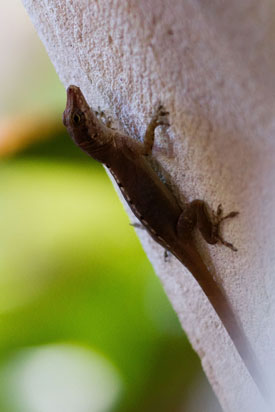
A male Anolis scriptus lizard hangs on. (Photo: Rian Castillo, Wikimedia Commons CC BY 2.0)
To find out they took lizards back to the lab, where they perched them on small wooden poles, then simulated hurricane force winds with a leaf blower, gradually ratcheting up the velocity. The researchers found that the lizards stayed on the perch, as opposed to fleeing, and moved to the lee of the perch – the side away from where the wind was blowing. As wind speeds increased, the lizards lost hold with their hindlimbs first, and hung on by their forelimbs until the wind was strong enough to blow them off their perches, unharmed, into a safety net.
If the lizards chose to hide from the wind, there would be no reason to think longer or shorter limbs would have anything to do with their survival. But because the lizards chose to ride out the storm on their perch, longer forelimbs could be advantageous.
Scientists caution that there may be other explanations for the body characteristics of the surviving lizards, but hurricane-induced natural selection, or in this case a leaf blower, seems like the best explanation. That’s this week’s note on emerging science. I’m Don Lyman.
Related link:
The paper in Nature: “Hurricane-induced selection on the morphology of an island lizard”
[SCIENCE NOTE THEME]
Beyond the Headlines With Peter Dykstra
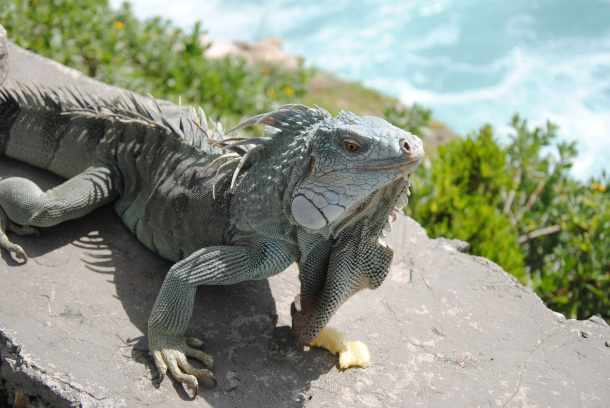
Fewer iguanas are falling from trees in Florida during the cold due to climbing global temperatures from climate change and a shift in cold hardiness in the lizards. (Photo: Steve Singer, Flickr, CC BY-ND 2.0)
CURWOOD: On the line now from Atlanta, Georgia is living on Earth commentator, Peter Dykstra. Hi there Peter, what do you have for us today?
DYKSTRA: Well, hi, Steve. You know, sometimes people use that old phrase, it's raining cats and dogs. But in Florida in recent years, it's been iguanas falling from the sky. When Florida has one of its occasional cold snaps, the reptiles literally freeze in the trees, and eventually just tip over, hit the ground or maybe even hit somebody upside the head.
CURWOOD: Well, of course, they are cold blooded lizards. So there you go. But when they're big, that must be quite a risk.
DYKSTRA: They're an invasive species, they can do some damage. If they're healthy and unfrozen. Iguanas can carry bacteria like Salmonella, they can eat plants and even small animals and they're digging and running can cause damage to sea walls and canal banks. Of course, Burmese pythons are an even bigger fright, to the extent that they've disrupted the ecosystem of the Everglades.
CURWOOD: So cold weather would usually knock back the iguanas and a big snake like a Python. But apparently these critters are adapting to our changing climate.
DYKSTRA: There's been some recent research to suggest that the iguanas are actually adapting to the colder weather they're not used to in the tropics, and that they are freezing and falling less often.
CURWOOD: Boy, well, you know, climate disruption, I guess the animals are adapting, adapt or perish. Ah, what else do you have for us?
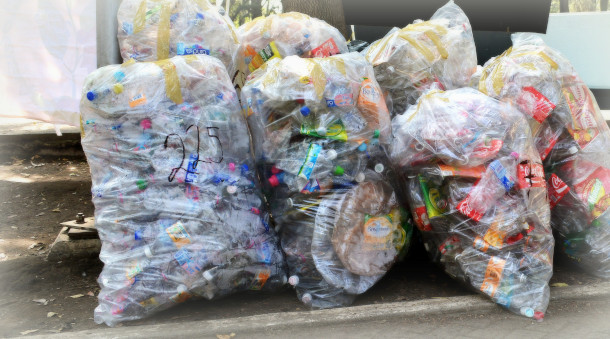
Starting in October, England will ban single-use plastic plates, trays, bowls, cutlery and some polystyrene cups and food containers. (Photo: Carl Campbell, Flickr, CC BY-SA 2.0)
DYKSTRA: Starting in October, England is going to ban some single use plastic products, plates, trays, bowls, forks and spoons and knives, polystyrene cups food containers. This is England, mind you, it's not all of the United Kingdom. There's a huge volume as there is in any developed country of plastic were used and immediately thrown away. Only 10% of all those plastic products are ever recycled. England has already banned plastic straws and some other things a few years ago, but they're still behind Scotland and Wales. They're behind the rest of the EU, which of course they're no longer a member of the European Union. They are ahead of course of the United States which has done little or nothing.
CURWOOD: That's right, Peter, there are some towns that have banned the use of plastic bags. I think even entire states have like Maine, but the United States No, I remember being in London just before the pandemic really hit and surprise surprise already the straws and drink stirrers had had gone away and people were lamenting it. This has stirred up some controversy I suppose that England is so far behind.
DYKSTRA: People are tough to adapt, and of course in this country an added factor is that the oil and gas industry remember all those plastic things come from petrochemicals are viewing plastics as a possible safety valve for the industry, as climate concerns may continue to cut back the use of fossil fuels to drive our vehicles, heat our homes, any other uses. Plastics can be another way for the petrochemical industry, the oil and gas industry to stay alive. And even at that they're a contributor in their own right to climate change.
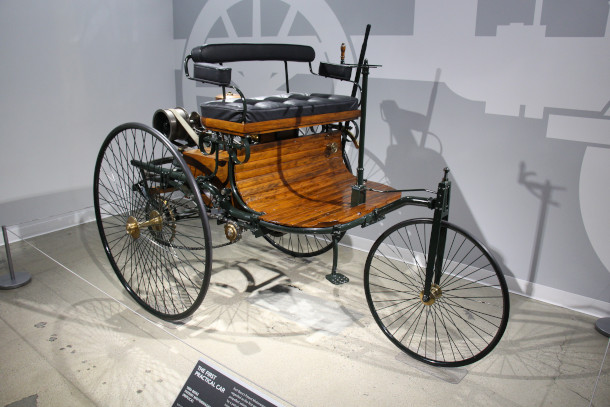
On January 29, 1886, German engineer Karl Benz applied for a patent for a three-wheeled, chain-driven, gasoline powered horseless carriage. (Photo: Cars Down Under, CC BY 2.0)
CURWOOD: That's right. Hey, what do you have from the vaults of history this week, Peter.
DYKSTRA: January 29 1886, a German engineer with a name that lives on today, Karl Benz applied for the first three patents for a three wheeled chain driven gasoline powered horseless carriage, sort of a precursor to the modern automobile. He had all three patents granted, the Benz company grew in the early 20th century, they merged with a rival company, Mercedes, and that brand name lives on today. And it's pretty costly.
CURWOOD: And actually one of the most important stories about Carl Benz is his wife, Bertha Benz. She not only made it financially possible for him to do this, but also invented some of the components gearing systems so that new horseless carriage with three wheels could climb hills, and also brake pads so you could slow the thing down.
DYKSTRA: I'll have to take your word for it, Steve. I was too young to have been there.
CURWOOD: Okay. Peter Dykstra is a living on Earth commentator. Thanks so much, Peter. We'll talk to you again real soon.
DYKSTRA: All right, Steve. Thanks a lot. Talk to you soon.
CURWOOD: And there's more on these stories on the Living on Earth webpage. That's LOE.org.
Related links:
- WeatherBug | “Florida Seeing Fewer Falling Iguanas as Reptiles Adapt to the Cold”
- The New York Times | “England Is Banning Some Single-Use Plastics. Activists Say It’s a Small Step”
- Mercedes Benz | “Carl-Benz”
Listening on Earth: Coquí Chirps
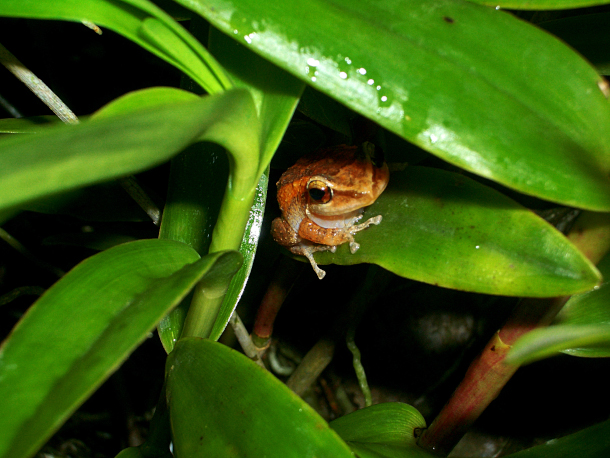
Coquí frogs are so named for their distinctive vocal call. (Photo: acevvvedo, Flickr, CC BY-NC 2.0)
[FROGS CHIRPING]
CURWOOD: We travel to Las Marias, Puerto Rico now with Coqui frogs.
[FROGS CHIRPING, NIGHT SOUNDS]
CURWOOD: Coquis are endemic to Puerto Rico and a national symbol for the island.
[FROGS CHIRPING]
CURWOOD: Many frog species, including coquis, were heavily impacted by Hurricane Maria, but within months of the storm they could once again be heard across the island.
[FROGS CHIRPING]
CURWOOD: A welcome sign that life would eventually get back to normal. Living on Earth’s Bobby Bascomb recorded these coquis in the mountains of Puerto Rico on a June evening in 2018.
[FROGS CHIRPING]
Related link:
Learn more about the coquí at the National Wildlife Federation
CURWOOD: Next week on Living on Earth the controversy surrounding entanglements of North Atlantic Right Whales with fishing gear. Researchers say the vast majority of the right whales have been caught up in ropes from lobster fishing gear, which can be deadly. But there is a better way. And people are working to develop gear that doesn’t require the vertical ropes that can entangle the whales.
BAUMGARTNER: If we think protecting right whales and other marine species is important, and we've enshrined that in things like the Endangered Species Act and the Marine Mammal Protection Act, we have a responsibility as a society to help fishermen through this. This is not their fault. Entanglements happen as industrial accidents. There's no fisherman out there that wants to hurt a right whale or any other species. And so the solution to that then is subsidizing the cost of the purchase of the gear.
CURWOOD: You can hear about efforts to design affordable whale safe fishing gear, next time on Living on Earth from PRX.
[MUSIC: New Swing Sextet, “Revolucionando” on Revolucionando, Craft Recordings]
CURWOOD: Living on Earth is produced by the World Media Foundation. Our crew includes Fern Al-ling, Naomi Arenberg, Bobby Bascomb, Paloma Beltran, Iris Chen, Josh Croom, Jenni Doering, Mark Kausch, Mark Seth Lender, Don Lyman, Jusneel Mahal, Louis Mallison, Aynsley O’Neill, Sophia Pandelidis, Jake Rego, El Wilson, and Jolanda Omari. Tom Tiger engineered our show. Alison Lirish Dean composed our themes. You can hear us anytime at L-O-E dot org, Apple Podcasts and Google Podcasts, and like us, please, on our Facebook page - Living on Earth. We tweet from @livingonearth, and you can find us on Instagram at livingonearthradio, and you can write us at comments@loe.org. I’m Steve Curwood. Thanks for listening!
ANNOUNCER: Funding for Living on Earth comes from you, our listeners, and from the University of Massachusetts, Boston, in association with its School for the Environment, developing the next generation of environmental leaders. And from the Grantham Foundation for the protection of the environment, supporting strategic communications and collaboration in solving the world’s most pressing environmental problems.
ANNOUNCER 2: PRX.
Living on Earth wants to hear from you!
Living on Earth
62 Calef Highway, Suite 212
Lee, NH 03861
Telephone: 617-287-4121
E-mail: comments@loe.org
Newsletter [Click here]
Donate to Living on Earth!
Living on Earth is an independent media program and relies entirely on contributions from listeners and institutions supporting public service. Please donate now to preserve an independent environmental voice.
NewsletterLiving on Earth offers a weekly delivery of the show's rundown to your mailbox. Sign up for our newsletter today!
 Sailors For The Sea: Be the change you want to sea.
Sailors For The Sea: Be the change you want to sea.
 The Grantham Foundation for the Protection of the Environment: Committed to protecting and improving the health of the global environment.
The Grantham Foundation for the Protection of the Environment: Committed to protecting and improving the health of the global environment.
 Contribute to Living on Earth and receive, as our gift to you, an archival print of one of Mark Seth Lender's extraordinary wildlife photographs. Follow the link to see Mark's current collection of photographs.
Contribute to Living on Earth and receive, as our gift to you, an archival print of one of Mark Seth Lender's extraordinary wildlife photographs. Follow the link to see Mark's current collection of photographs.
 Buy a signed copy of Mark Seth Lender's book Smeagull the Seagull & support Living on Earth
Buy a signed copy of Mark Seth Lender's book Smeagull the Seagull & support Living on Earth

